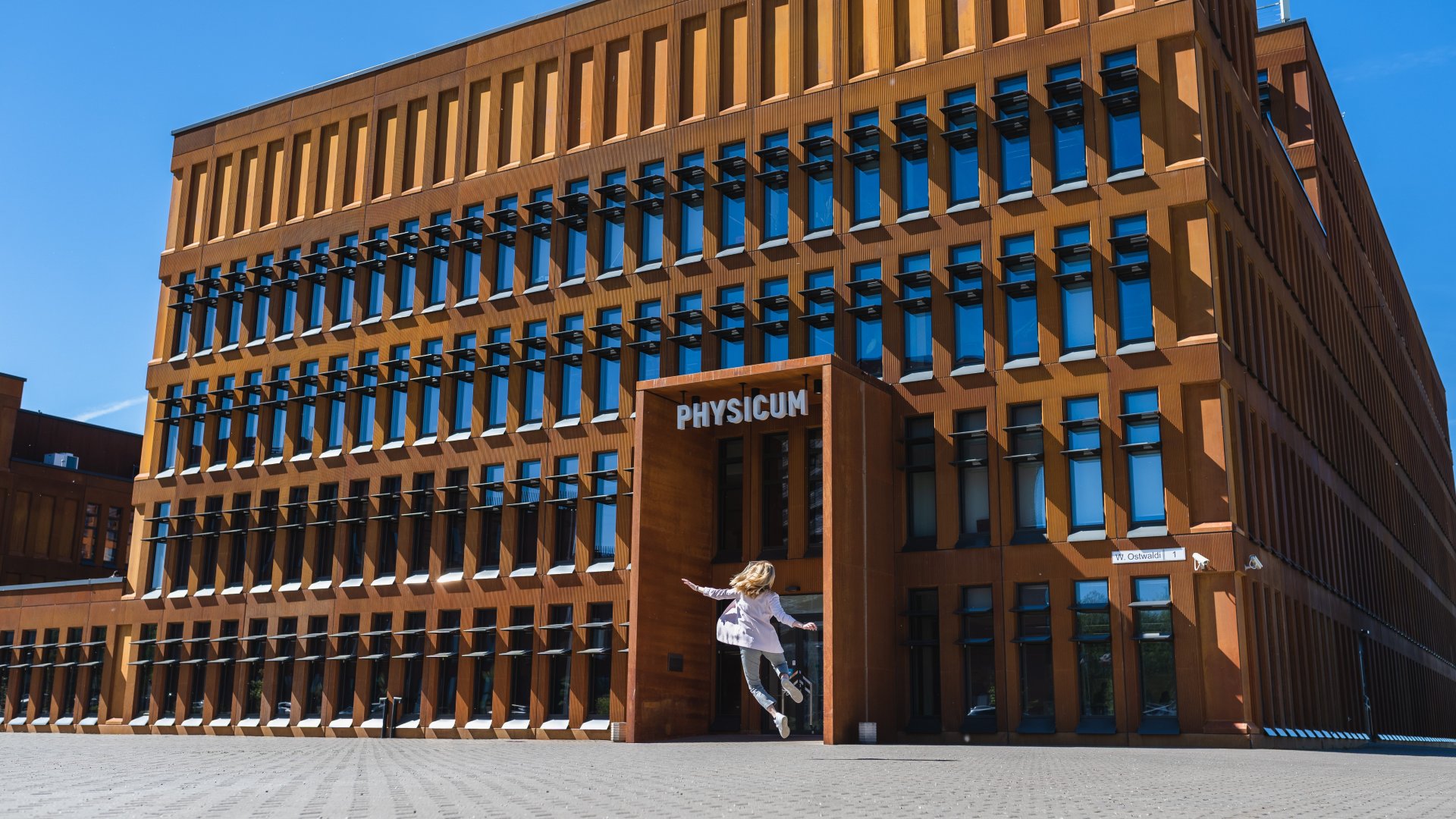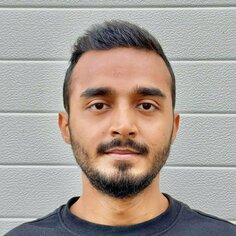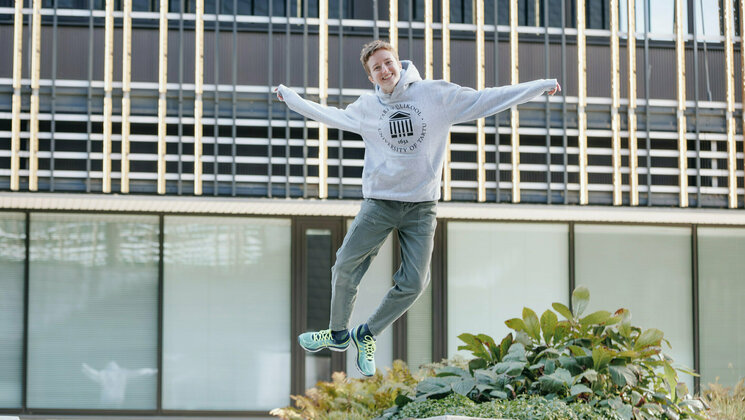Materials Science and Technology
Master's
2 January
15 March
30 April
1 September
- The University of Tartu belongs to the top 350 universities in the world (see Rankings and Surveys).
- Focus on developing and commercialising new materials and their applications.
- Each student joins a laboratory and participates in the lab's scientific work. You can choose between the labs of the Institute of Physics, the Institute of Chemistry, and the Institute of Technology.
- An internship is a mandatory part of your studies.
- Professor Mikhail Brik belongs to the top 1% of the most-cited scientists in the world (ESI 2023).
- After graduation, you can work as a specialist, developing materials in manufacturing enterprises, research institutions and laboratories. You can also start a business handling materials or continue your studies at the doctoral level.
Materials Science and Technology is a master's programme focusing on developing and commercialising new materials and their applications. Studies of materials science are combined with acquiring the basics of entrepreneurship.
The programme provides knowledge of theoretical principles of materials science, testing and investigation methods and development and design of materials. Students' development projects are done in cooperation with scientific laboratories, where they also perform the experimental part of their master's thesis.
Graduates can work as specialists in materials development in manufacturing enterprises and research institutions, start and run new small and medium businesses handling materials or continue their studies at the doctoral level.
Learning outcomes
Graduates of the Materials Science and Technology master's programme have a comprehensive and systematic understanding of modern materials, encompassing their structure, properties, manufacturing technologies, and principal methods for research and testing. This foundation is complemented by a broad awareness of the latest developments, subjects, and practical applications within the field of materials science. Furthermore, students gain specialised knowledge in specific research areas, enhancing their expertise and positioning them as knowledgeable contributors to the discipline.
The programme also introduces the fundamentals of entrepreneurship, fostering an appreciation of the intricate relationship between materials science and the business sector. This knowledge equips graduates to undertake scientific and developmental tasks within materials science, allowing them to identify and forge cross-disciplinary connections and apply their skills to real-world challenges. They learn to articulate problems related to materials development in a business context and devise solutions within set timeframes, employing relevant information and methodologies.
Critical self-assessment is a key skill developed during the course, enabling graduates to reflect on their work with a critical eye. They are trained to effectively communicate their professional expertise orally and in writing, engage in discussions with specialists, and make their knowledge accessible to those outside their field. Teamwork is emphasised, with students learning to collaborate effectively, including in leadership roles.
The programme instils a readiness to engage actively in civil society, underpinned by a tolerance for diverse perspectives and opinions. Graduates are aware of their work's ethical dimensions, recognising their opportunities, limitations, and societal roles. This awareness extends to understanding the importance of ongoing learning and the capacity to evaluate the need for further training.
Prepared to contribute to research and development in materials science, graduates are poised to undertake roles as materials developers in the business world, showcasing their readiness to address challenges and innovate in their field. This holistic approach to education ensures that graduates are skilled in the technical aspects of materials science and are also socially responsible and adaptable professionals capable of navigating the complexities of the modern world.
Why study Materials Science and Technology at the University of Tartu?
The University of Tartu belongs to the top 350 universities in the world (see Rankings & Surveys).
Each student joins a laboratory and takes part in the scientific work of the lab. The students can choose between the labs of the Institute of Physics, the Institute of Chemistry, and the Institute of Technology. Some examples of the topics:
- Biomaterials and biocompatible coatings deposited by the atomic layer deposition method for denture applications
- Materials for biomedical application - scaffolds which can be used to grow human skin in lab for transplantation to help patients with severe skin damage
- Nanostructural materials and effects of nanoparticles to the properties of composites
- Artificial muscles and electroactive polymers
- Materials for future energetics – fuel cells and supercapacitors
- Technologies for producing and properties of aerated concrete
Internship is a mandatory part of the programme.
Programme highlights in media
- Watch here the programme director talk about the master's programme in Materials Science and Technology during Virtual Open Day 2024.
Curriculum version:
More info: Study Information System
Institute of Physics
Physics is the foundation for various natural sciences and provides knowledge for several scientific fields and disciplines. The Institute of Physics offers a comprehensive education in physics and materials science and equips students with widely applicable science skills and competitiveness in the job market. Scientists at the Institute of Physics conduct nationally and internationally important research in the diverse fields of physics and materials science, often with interdisciplinary reach.
The Institute of Physics is located in the modern study and research building Physicum, which was opened in 2014. The building of approximately 13,000 square metres provides contemporary facilities for research in physics, materials science and nanotechnology.
Read more about the Institute of Physics here.

Visit us virtually
Explore Tartu, the Institute of Physics, and the student dormitories through the university's virtual tour here.
After graduation
Graduates can work as specialists developing materials in manufacturing enterprises or research institutions and laboratories. They have the knowledge and skills to start and run new small and medium businesses handling materials. Graduates can continue their studies at the doctoral level.
Alumni insights

Līga Britāla, an alumna from Latvia, graduated from the master's programme in Materials Science and Technology in 2021. Liga is a scientific assistant at the Institute of Solid State Physics, University of Latvia.
What was the most memorable experience from your studies at UT?
By far, the most memorable experiences were gained by joining the International Student Ambassadors. The most heartwarming memory with the ISA is from a Christmas event where everyone came with their special home-cooked meals, and we all had a lovely time in a rented house just outside Tartu. I gained life-long connections from that lovely bunch.
What do you think is important to know about your programme?
I think this applies to all degree programmes, but you should look into the scholarships offered by the UT (programme-specific and not). They took a tremendous financial burden off my shoulders during my studies in Tartu, allowing me to focus on my studies and have some fun.
Can you share the practical experiences you encountered within and beyond the classroom?
For 1.5 years during my master's studies, I worked at the Institute of Physics, UT, modelling metasurface interaction with electromagnetic radiation for advanced CO2 sensors. Besides scientific work, I also worked full-time at Playtech as a technical support specialist. It was a role I could easily fit around my studies, and the extra income allowed me to save up a bit.
If you could give any advice to a new student, what would it be?
Be proactive! Figure out and seek out what you want.

Samiullah Javed, an alumnus from Pakistan, graduated from the master's programme in Materials Science and Technology in 2024. Sami works as a Quality Specialist at Interchemie Werken De Adelaar Eesti AS.
What was the most memorable experience from your studies at UT?
My time at the University of Tartu was filled with incredible memories, but one of my favourites was playing hand football with my classmates after class. It wasn't just a game but a way to connect with people from different cultures and grow personally and academically. One memory that stands out is when, after a game, an Estonian friend introduced me to the sauna, an entirely new experience for me. That moment left a lasting impression and also led to a lifelong friendship.
What do you think is important about your programme?
The master's programme in Material Science and Technology has a perfect balance between theoretical, practical, and entrepreneurial knowledge. One of the aspects I deeply appreciated was the flexibility it allowed us to take courses from any faculty within science and technology. Another highlight was the availability of scholarships, which made quality education accessible. I would encourage students to explore the diverse range of scholarships and financial aid opportunities available.
Can you share the practical experiences you encountered within and beyond the classroom?
During my studies, I had the opportunity to work on several projects. One project involved studying the compressive strength of cement and porous clay composites, where I gained hands-on experience with various materials and learned how different raw materials affect compressive strength. Beyond the classroom, I undertook an internship in a Quality Specialist role, which provided valuable work experience and taught me the importance of time management.
If you could give any advice to a new student, what would it be?
- Be organised: Always keep track of your deadlines and aim to submit assignments at least a day early.
- Stay connected with your programme director: They are an incredible resource who can guide you, resolve issues, and keep you informed about opportunities.
- Be curious: Stay curious and eager to learn; it's one of the best ways to grow.
Why choose the University of Tartu?
I chose the University of Tartu because it offers high-quality education at an affordable cost. Looking back, it was one of the best decisions I've made. The professors were genuinely supportive, and the university's facilities and research opportunities pushed me to challenge myself academically. Tartu is an amazing place, a student-friendly city with a rich history and plenty to do beyond the classroom.
Why Estonia?
I chose Estonia because it's a place where settling in is incredibly easy. Everything is digital, from signing documents to accessing public services. The combination of affordable living, quality education, and a safe environment made it an ideal choice. Though the country is small, it offers peace and stunning natural beauty. I loved spending my weekends hiking. Once you get to know the people, you'll find them warm and welcoming.
Admission requirements for Materials Science and Technology
• bachelor’s degree or equivalent qualification (must be obtained by the end of July) in science, technology, or engineering, encompassing at least 45 ECTS in mathematics, physics, chemistry, materials science or engineering – please see our country-specific document requirements
• English language proficiency – please see our acceptable tests and exempt categories
NB! The restrictions for the citizens of the Russian Federation are specified here.
Applications are evaluated based on
- the average grade of the previous study level (yields 30% of the final score)
- the score of the motivation letter (yields 30% of the final score)
- interview (yields 40% of the final score)
All applicants to the Materials Science and Technology programme are required to submit a motivation letter (in English, maximum of 1500 characters with spaces) which should be based on the following points:
- Please describe briefly your previous studies and work experience, as well as your personality. Explain how your educational and professional background relates to the programme you are applying to.
- What is your personal motivation to study materials science and technology? In which role do you see yourself in your job after completion of the programme?
Note that the motivation letter must be submitted with your online application by 15 March at the latest.
Evaluation criteria:
- Knowledge in the fields of science and technology and fit between the student’s background and goals, with the study programme (50%);
- Analytical and argumentation skills (30%);
- Fluency in written English (20%).
The maximum score for the motivation letter is 100 points and the result is positive only if the applicant gains 51 points or more.
The interview is designed to determine the applicant's readiness to study in the Materials Science and Technology master’s programme. Only the candidates who receive at least 51 points from both their average grade and their motivation letter, will be invited to the interview.
The duration of the interview is 20 minutes and it is conducted in English either via internet or in person. Admission interviews take place between 15-16 April 2025. The interviews will be scheduled in cooperation with qualifying candidates when the motivation letters are evaluated.
The interviewee will be evaluated based on the following conversation topics:
- Candidate’s previous studies and experience related to materials science, technology, and related areas, and his/her motivation;
- Short questions about the basics of mathematics, chemistry, physics, and materials science;
- Skills in analysis, argumentation, and self‐ expression in English.
At the online interview:
The applicant must have an identity document.
The applicant has to ensure that the room where they stay is free from other persons or background noise.
The applicant must take into account that they are not allowed to record the interview.
Only those applicants who score 66 points or higher (out of 100) as a combined score from the motivation letter, average grade of the previous study level and interview, will be considered for admission.
Further information on assessing candidates´ academic performance and calculating admissions´ score.
How to apply
The following information applies to international students and Estonian students who graduated abroad:
The application system opens on 2 January and closes on 15 March. The following documents must be submitted electronically via DreamApply by 15 March:
- online application
- motivation letter
- official certified copy of the bachelor's diploma or its equivalent and Diploma Supplement (transcript) in the original language (must include a description of the grading scale).
NB! Applicants graduating in the upcoming spring/summer and having their diploma and final transcript issued later than the application deadline should electronically submit their most recent official transcript by the application deadline. The transcript should be supplemented by an official statement from the issuing institution indicating current enrollment and expected graduation date. Admitted candidates are required to post certified copies of their graduation documents as soon as these have been issued (must reach us no later than by the end of July). - official translation of the bachelor’s diploma and Diploma Supplement (transcript) into English, translation certified
- proof of English language proficiency
- copy of the passport page stating the applicant’s personal particulars
- confirmation/receipt of application fee payment (if applicable). All international applicants are required to pay the application fee EUR 100, unless they have completed the previous study level in Estonia. An application will only be processed after the fee has been received by the UT.
Submitted applications can not be edited. It is only possible to upload new documents (e.g. graduation certificates). Applicants will receive feedback and notifications through the DreamApply system to their e-mail. Incomplete applications or those submitted by e-mail will not be considered for admission.
Guide to submitting an electronic application on DreamApply.
NB: The University of Tartu has no official partnerships with agents or educational representatives. We strongly recommend applying directly to the university without the help of unauthorised third-party entities. Should you use such a service, please ensure that your application's contact information is your personal details (your e-mail, phone number, etc.).
The evaluation of applications will be made based on the electronic copies added to DreamApply. A general ranking list will be formed based on the electronically submitted applications and admission results (including offers) will be announced to all applicants personally via DreamApply by April 30 at the latest. Admitted candidates are expected to accept or decline the offer in DreamApply in 7 days. If the decision is not communicated to UT via DreamApply by the stipulated deadline, UT reserves the right to withdraw the admission offer.
NB! It is not possible to postpone the beginning of studies to the next academic year.
Terms and conditions of the admission offer
Admission offers are conditional. This means that there are conditions in the offer which the applicant needs to fulfil in order to be admitted (e.g. sending application documents by post; obtaining the required level of education). If the conditions are not met, UT has the right to withdraw the offer. Also, UT reserves the right to withdraw or amend any offer or revoke the matriculation of a student, if it becomes evident that the application contains fraudulent information, the qualification does not provide access to the chosen study programme or the student is found to have omitted key information from the application. Should such circumstances occur, UT will not be liable for any material or immaterial loss which the student may suffer as a result.
Once the admission results have been announced, all admitted students are required to send the application documents by post to: Student Admissions, University of Tartu, Ülikooli 18-133, Tartu 50090, ESTONIA.
The documents are expected to be mailed only by those receiving the admission offer (unless instructed otherwise by the admissions staff). The documents must reach the university within 3 weeks from the announcement of the offer. If the application documents do not reach us by the deadline, the university has the right to withdraw the admission offer. Applicants will be informed when their documents have arrived.
Requirements for educational documents
All copies of educational documents (diplomas and Diploma Supplements/transcripts) must be officially certified. By certified we mean that the copies should bear an original signature and seal of the authority certifying that these are true copies of the original document(s). The copies can be certified either 1) by an authorised official of the issuing institution, or 2) by a notary, or 3) with an Apostille attached. NB! Country-specific requirements may also specify the way documents from certain countries must be certified.
Please note that UT does not accept simple copies made on the basis of already certified copies (primary copies are needed).
All admitted students are required to present their original qualification certificates upon arrival (unless these were sent directly from the issuing institution).
Paying the tuition fee (applicable to those receiving a fee-based study place offer)
- EU/EEA/Swiss citizens are required to pay the fee for the first semester once they arrive in Tartu (by 20 September at the latest after signing the fee contract, please read more here).
- Admitted students from other countries are required to pre-pay half of the first semester's tuition fee. The invoice along with the pre-payment deadline and payment details will be sent to applicants via DreamApply after they have accepted the admissions offer and the University has received the hard copies of the application documents. Second part of the fee is due on 20 September. NB! The official admission letter (necessary for visa application) will only be issued once the University of Tartu has received the pre-payment.
- NB! Once you have been offered a fee-based study place, be aware that it will not be changed into a fee waiver study place. By transferring the pre-payment to the university, you confirm that you have informed yourself about the process of the visa and temporary residence permit application and you are able to arrive in Estonia by the start of the academic year. If you have any questions please contact studentvisasupport@ut.ee.
The official admission letter will be sent to admitted students electronically via DreamApply only after the admissions office has received and reviewed hard copies of the application documents, and received the tuition fee pre-payment (if a pre-payment was required, please see step 3 for more details).
NB! The electronic admission letter is also sufficient for non-EU students for applying for visa/residence permit at an Estonian embassy.
Once the admission letter is issued, accepted students may proceed further with arranging their arrival. All non-EU students should first consult information on the process of visa and temporary residence permit application to be sure, as where and when the relevant documents need to be applied. Note that housing at the UT dormitories can be applied during a limited period of time, unless specified otherwise on the website.
NB! Admitted students who are not citizens of an EU or EEA country or Switzerland need to make sure they obtain the Estonian long-term visa on time in order to be able to participate in the orientation programme for international students held in the last week of August. They are also required to visit the Admissions Office in person to complete their arrival registration by September 1, 2025, at the latest. Failure to do so will result in the revocation of their admission decision and visa.
For housing alternatives please find further information on Tartu Welcome Centre website. Travel information can be found here. Based upon common queries, the most important information has been summarised into a pre-arrival information website UT Getting Started.
Estonian applicants should apply via National Admission Information Systems (SAIS). Further information in Estonian is available here.
Contacts
Ask about the admission requirements and application process
Find out what awaits you at UniTartu

07.02.2025




